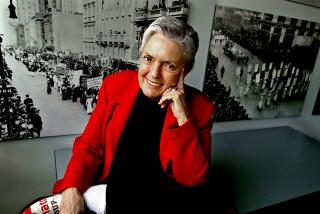The Actress and the Novelist
- Share via
In the centennial of Pearl S. Buck’s birth, it remains a literary and political mystery that America’s only woman winner of the Nobel Prize for Literature is scorned or ignored by elites in her two homelands, the United States and China, while her books continue to sell in large quantities worldwide.
The literary side of the mystery is mainly an American phenomenon--the fact that she is much out of fashion with the critics. This is hardly a new thing. Her sudden national fame in 1931, with the publication of “The Good Earth” (and the Pulitzer Prize that book earned), surprised the American literary gurus.
But her Nobel award in 1938--given not merely for “The Good Earth” but for work including the brilliant twin biographies of her parents, “Fighting Angel” and “The Exile”--caused a great venting of spleen in the cultural Establishment. How could this upstart China missionary wife have won something overdue to Theodore Dreiser and other acclaimed male authors? (Later, they would say that she simply wrote too much and was too “popular,” or sentimental.) She was, nonetheless, celebrated in America quite recently on a five-cent postage stamp.
As for the political mystery about Buck, the story is much more complicated and entirely Chinese. She is still anathema in China, until recently a forbidden topic. But to explain this we have to go back to beginnings:
When “The Good Earth” was published 60 years ago, intellectuals and modernizers from China’s urban sectors objected to its graphic but astonishingly accurate depiction of peasant life in the “backward” nine-tenths of the nation, and they hoped she would not make a movie of the book. For China’s sake, it is fortunate that she did, since the film’s release coincided with Japan’s all-out invasion of the mainland in 1937, and the American public fervently sided with Buck’s peasants in their resistance to the brutal Japanese aggressors. Indeed, that movie had more viewers than any in history until “Gone With the Wind.” Thanks in part to Buck’s impact, funds from Middle America poured into the various China-relief agencies she helped organize before and after Pearl Harbor.
Still, some of the Chinese intelligentsia, from 1938 onward, were soured by the fact that a white American missionary daughter and wife--rather than a Chinese writer--had won the world’s most coveted literary prize for writings about China. That grievance was muted in part when the Nobel Committee added to its selectors a person who reads Chinese and follows Chinese writers.
But there is a much more curious and bizarre reason why Buck remains intensely controversial in China today. There she has long been known as “Sai Zhenzhu”--the Sai is for the first syllable of her maiden name, Sydenstricker, and the Zhenzhu is Chinese for pearl--and Sai Zhenzhu, 19 years after her death in 1973, is still on the Beijing foreign ministry list of enemies of “new China.”
As a result, Chinese academics these days, newly eager to explore her writings and influence, have had to cancel international symposia on Buck because foreign participants could not be given visas by the ministry. Even an American PBS film team, trying to recapture the China Buck wrote about so enduringly, has been denied access.
If one discreetly asks the higher-ups for an explanation, they respond that this issue is too hot to handle, and can be resolved only by some key person in the Politburo who is willing to rehabilitate Sai Zhenzhu. Meanwhile, of course, the octogenarians who rule China in their twilight years have bigger things on their minds.
Why all this Chinese fear of an American woman long dead? The answer is curiously simple, though it has its Byzantine aspects.
Buck eventually did denounce the Chinese Communists after 1950, as she had previously spurned the Chinese Nationalists, under Chiang Kai-Shek. With the Nationalists, the issue for her had been their corruption and authoritarianism; with the Communists, the issue was their surge into totalitarianism, and especially their assault on the traditional family structure.
Many American writers denounced one or the other, or both, and were let back in after the Nixon breakthrough of 1971-2. But Buck had inadvertently hit a tripwire, about which we have only learned recently. As a major American celebrity in the 1930s and ‘40s, also much interested in the theater and films, she helped advance the career in those years of a Chinese stage and movie actress, Wang Ying, who performed in America as well as China with Buck’s strong support. However, Wang Ying earlier had won the leading role in a major Shanghai play from her arch-rival, the actress Jiang Qing. Jiang Qing soon became the wife of Mao Zedong, and she never forgot or forgave Buck’s friendship with Wang Ying.
Some may marvel or scoff at the idea that such petty clashes of long ago could affect the standing of Pearl Buck in China today. Yet three years of probing on this subject have convinced me of the following, on the basis of Chinese sources whose names cannot be used:
In 1972, when Buck applied to the Chinese government for a visa to revisit her Chinese homeland at long last, and went through many months of delays, Foreign Minister Zhou Enlai (chief recipient of her appeals) was in deep trouble. He and his moderate faction were still at odds with Mao’s wife and the other members of the radical “Gang of Four.” At that time, Zhou found it useful to write a long internal memorandum denying Buck’s visa request and denouncing her as an enemy of the Chinese Revolution (a copy, of course, to Mrs. Mao). That memo, I am told with assurance, is still alive and well in the files of the foreign ministry--and the sainted Zhou Enlai’s authorship makes it too daunting a document for any Chinese but the Politburo to declare null and void.
There is a sad footnote to the Wang Ying story. The actress, having run afoul of McCarthyism in the United States, returned to China in the 1950s but was later persecuted by the Gang of Four during the Cultural Revolution. She died in prison in 1974, a year after Buck’s death--”a prey in particular to the vindictiveness of Jiang Qing, who hated and tried to destroy all who had known her in the film world of pre-World War II.” The words are those of the emigre American journalist, Israel Epstein, long in the employ of the Chinese Communist government, in an April 1989 Beijing review of the English translation of Wang Ying’s long-suppressed autobiography, “Child Bride.”
But back to Pearl Buck: Why should one care about her in this centennial year of her birth? Because such literary and political mysteries on both sides of the Pacific, caused by the American elite and Chinese politics, have failed to silence her unique voice. She remains the most influential Westerner to write about China since 13th-Century Marco Polo.
More to Read
Sign up for our Book Club newsletter
Get the latest news, events and more from the Los Angeles Times Book Club, and help us get L.A. reading and talking.
You may occasionally receive promotional content from the Los Angeles Times.










